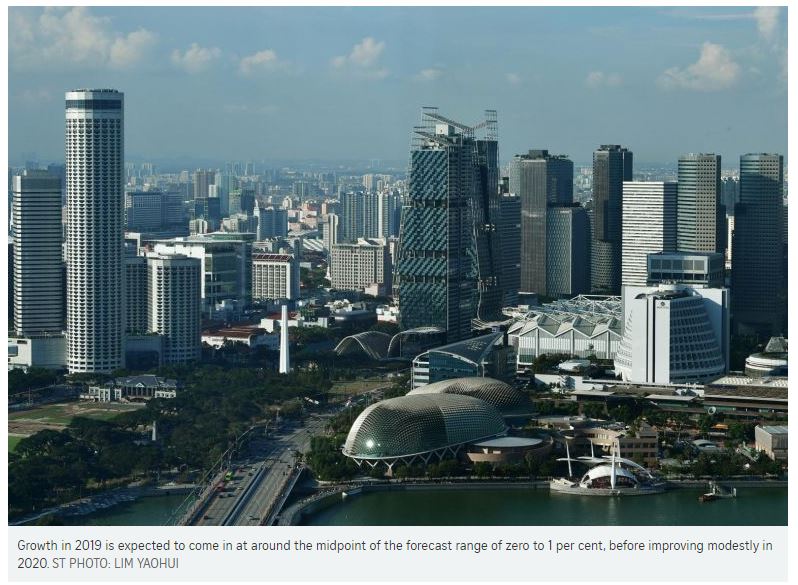Singapore economy to stay tepid in 2020; ‘significant uncertainties’ for trade-related sector: MAS
SINGAPORE – Singapore’s economy is likely to continue facing headwinds into 2020, seeing lacklustre activity over the next 18 months, said the Monetary Authority of Singapore (MAS) on Wednesday (Oct 30).
Growth will be uneven across industries, with “significant uncertainties” for the trade-related cluster, the central bank added in its twice-yearly macroeconomic review.
Part of this stems from higher volatility in the electronics-related industries. Semiconductor producers, for example, have been seen to draw down inventories to meet new orders instead of stepping up production in view of uncertain demand.
Reconfigurations of regional trade flows and supply chains could pose further unpredictability for Singapore, said MAS.
Economists said that even though a strong rebound is unlikely in the coming months, they see some light at the end of the tunnel.
Ms Selena Ling, head of treasury research and strategy at OCBC Bank, said the baseline expectation appears to be slow growth persisting into 2020, with the biggest risks remaining the US-China trade, tech and currency tensions as well as dampened demand conditions.
But the Republic is likely to escape a technical recession – two consecutive quarters of quarterly decline – and full-year recession if global growth stabilises in the later part of next year, she told The Straits Times.
Ms Ling also noted that a full-year recession in 2019 is “highly unlikely”, unless there is a very sharp drop in fourth-quarter growth. This does not look to be on the horizon for now, she added, given US-China trade talks and China stimulus measures are under way.
DBS senior economist Irvin Seah noted that high frequency data suggests growth is going through a “bottoming out” process, meaning an uptick is on its way. For example, global semiconductor shipments, in absolute dollar value, is rising month on month, he said.
“I would dare say that the worst of the current growth cycle is already behind us, but I do not expect a strong rebound in the coming months,” he said.
Tepid growth is likely to persist into mid-2020, given the lack of a “forceful positive catalyst” in the global environment, he said.
But he added that risk factors appear to be gradually dissipating, and these include the declining risk of a no-deal Brexit, a glimmer of hope in US-China trade talks, as well as key economies globally having introduced policy support.
For now, MAS expects that a prolonged period of heightened uncertainty will keep the global economy entrenched in weakness, with firms cutting back production and delaying investment plans.
“The domestic economy could experience fits and starts for the rest of the year, and into 2020,” MAS added.
Already, Singapore’s economic growth has slowed considerably to 0.1 per cent from a year ago in the second and third quarters, down from an average of 1.2 per cent in the two quarters before that.
Growth in 2019 is expected to come in at around the midpoint of the forecast range of zero to 1 per cent, before improving modestly in 2020.
With MAS already easing monetary policy slightly, Mr Seah expects fiscal support to remain on the cards for Budget 2020, which should be a “highly expansionary” one.
“The Government has a huge chest of ammunition, or fiscal room, to manoeuvre,” he said, noting that the accumulated surplus for the current term of government stands at a conservative estimate of $15.6 billion.
This does not include the Net Investment Returns Contribution, he added, although he expects any measures to remain targeted rather than broad-based.
On Wednesday, MAS noted that: “Overall, the weakness has largely been contained within the electronics-related segments.”
While a downswing in the electronics cycle and US-China tensions have dragged the trade-related cluster, modern services have been the main anchor of growth, and is likely to remain a key source in 2020 – even as it sees some slowing as well.
Growth in modern services has been underpinned by “robust expansion of digitalisation-related activities” in the information and communications technology, as well as finance and insurance sectors, said MAS.
The cluster is likely to remain important amid ongoing digital transformation efforts.
In the financial and insurance sector, providers of credit card networks will continue to benefit from strong expansion in electronic transactions, bringing positive contribution to growth into 2020 as well, said MAS.
The increasing ubiquity of e-wallets and payment gateways will boost transactions, and a shift towards e-commerce platforms will further buttress demand for electronic transactions, opening doors to other growth areas.
But despite the fintech boost, there are some road bumps – loan growth is not expected to pick up significantly, and growth in business services is expected to ease further for the rest of the year.
The less favourable global and domestic environment could dampen demand for office space, while lacklustre growth in private commercial certified payments in recent months is set to continue.
“Even if the robust expansion of professional services persists, it would not fully offset the weakness in the larger real estate segment,” said MAS.
The domestic-oriented cluster will be supported by the recovery of the construction sector, which has a “healthy pipeline” of public and private sector projects, while consumer-facing industries are expected to remain sluggish.
The outlook for retail remains muted, with consumer sentiment remaining susceptible to weakness in the overall economy. Further cutbacks in spending are still a possibility, said MAS.
Source: https://www.straitstimes.com/business/economy/singapore-economy-to-stay-tepid-in-2020-significant-uncertainties-for-trade-related


 English
English




